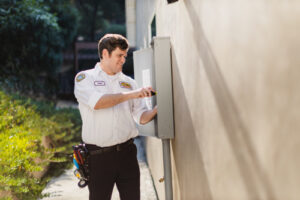 What’s the Difference Between a Fuse Box and a Circuit Breaker Box?
What’s the Difference Between a Fuse Box and a Circuit Breaker Box?
Your house is filled with electrical circuits that bring power to your lights, appliances, entertainment, and HVAC systems. When too much current travels through these circuits, it can damage your property and even cause a fire. Fuses and circuit breakers are devices that prevent these mishaps by interrupting an overload of electricity, but they work in different ways. Fuses melt to increase resistance to the current and stop it from flowing, while circuit breakers trip to shut off power, which opens to temporarily disconnect the circuit to prevent it from overloading or shorting out. Let’s explore the difference between these important home safeguards and why replacing breakers and fuse boxes if they are damage is beneficial.
Fuses and Fuse Boxes
Electrical fuses are encased metal filaments with a low melting point that are deliberately installed within a circuit to serve as a weak point that is vulnerable to high current. When an excess of current passes through the wire, it will destroy or “blow” the fuse to mitigate any danger to the electrical systems in the house. To restore the circuit so it can supply power again, the fuse must be replaced.
A fuse box is a metal box that typically holds six to twelve cartridge or screw-in fuses and supplies power to all of the circuits in the house. It typically has a 60-amp capacity if the house is older and a 200-amp capacity if it’s functioning in a modern residence.
Fuse boxes are less common in newer houses, but they are still designed to comply with residential electrical codes. If your home is more than sixty years old and still has its original electrical panel, it probably has a fuse box. Knowing how to maintain and use your fuse box can help keep your house safe from fire, so it’s helpful to learn about its amperage rating and understand how much electric power it can handle. This way, if you happen to blow a fuse, you can be sure that its replacement is properly rated to do its job.
Circuit Breaker and Circuit Breaker Panels
If your home is less than 60 years old, you probably have a circuit breaker panel or “breaker box” that holds circuit breakers instead of fuses.
When too much current runs through your wiring, a circuit breaker will “break” its flow. Circuit breakers are mechanical devices that respond to electrical overloads by “tripping” open, which physically stops current from moving through the circuit and causing electrical damage.
While a fuse consists of an encased metal element, a circuit breaker is a plastic device that holds a bi-metal strip. When excess current flows through the breaker, it heats up, but instead of melting, it expands and bends until it pops open. This physically breaks contact between the strip and the wire so that the electricity can no longer travel through the circuit.
Breakers are more advanced than fuses because they can be reset by flipping them “on” after they trip, while fuses must be replaced after they melt. They also have lower current thresholds than fuses, which helps them respond more quickly to an overload and prevent electrical shocks and fires. At the same time, their design makes them more suitable for use in contemporary homes, which tend to require increased amperage to run more appliances at once.
Circuit breakers are contained in a main circuit breaker panel, or breaker box, which serves as a hub for the wiring in your home. Similar to many fuse boxes, the breaker panel usually contains twelve breakers that connect to different circuits in your house, with one circuit per breaker and a disconnect switch. Single-pole breakers, which carry 120 volts of current, are common in American homes. When a breaker trips, it deactivates its circuit without affecting the other circuits in your home.
The main difference between a fuse box and a circuit breaker panel is how they handle an overload of current. Fuses are more basic and less sensitive than circuit breakers, and they must be replaced anytime they blow. Circuit breakers are designed to be resilient, and they may allow you to run more powered devices in your home at once with less fear of damage from an overload.
Which Kind of Electrical Box is Right for Your Home?
Though you may take your electrical panels for granted, it’s good to consider whether a fuse box or a circuit breaker panel will best meet your needs and keep your home safe from harm. People who use relatively little electricity may easily get sufficient protection from a fuse box, while others who run several devices like refrigerators, computers, hair dryers, blenders, and washing machines at once may do better with a circuit breaker panel. A licensed electrician can help you discover which type of box will suit your house best.